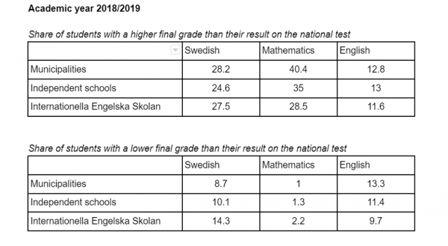News | 24 May 2022
IES welcomes a serious discussion about grading and the implementation of a system for central correction
Regarding Vetenskapens värld: Det svenska skolexperimentet 3. Friskolorna och glädjebetygen, Swedish Television on May 23, 2022.

At Internationella Engelska Skolan, teachers, academic managers and principals work hard every day to ensure grading is as correct and fair as possible. It is a constant and ongoing process, which can of course be improved and honed.
Correct and fair grading is crucial so students know where they stand in relation to the knowledge targets and for admission to higher studies. Incorrectly set grades are, in the cases where they occur, a problem that must be taken very seriously. IES has taken several measures to prevent grade inflation, a process that will continue year on year, in every grade and at every school, as part of our systematic quality work.
Grade integrity is the priority of our systematic quality work. In 2021, we introduced a new form of statistics database that both the individual schools, and IES centrally, use to evaluate, compare and analyze grading. Any indication of deviation is taken very seriously.
Subject teachers at IES schools also follow a process for joint assessment to ensure that grading is correct and fair. IES has also, in several parts of the country, initiated collaborations with municipal schools to compare grading and learn from each other. The results of national tests are also indicative of grading and are taken into account, especially when teachers set grades.

The latest statistics from the Swedish National Agency for Education (Skolverket, 2018/2019) show that any discrepancy between the results of national tests and final grades is generally smaller for IES than for the country as a whole in terms of the core subjects English and mathematics. In the subject Swedish, a deviation was noted downwards, meaning that IES gave lower grades than the results of the national test.
In the reassessment of the national tests that the Swedish Schools Inspectorate (Skolinspektionen) conducted in 2018, the image was strengthened that IES's work with grading functions well, as in most cases audited IES schools had a higher proportion of grades which matched those the authority awarded, when compared with the national average.
The Swedish Schools Inspectorate, which recently examined how 30 school operators work with grading, also confirms that IES works well in this area. The report School Operators Work to Promote Fair and Equivalent Grades in Primary School was released last week. IES was one of the school operators examined and received the Swedish Schools Inspectorate's individual decision in December. The Swedish Schools Inspectorate's investigators state in their decision that IES "implements measures with high quality to create conditions for a fair and equal grading".
It is therefore unfortunate that IES was highlighted by SVT's science editorial staff as one of the actors in Sweden alleged to be driving a trend of setting grades which are too high, a statement that was also repeated in SVT's news broadcasts. The research on which SVT's reporter based his claims is not clear from the program. IES has contacted the science editorial office to find out. The fact that the quoted economist, Jonas Vlachos, may represent all research in the field, alone and unchallenged, makes the scientific basis of the program weak.
IES welcomes a serious discussion about grading and about what all players in the school sector can do to develop education in Sweden and address the challenges that exist. We would like to see more collaboration with other schools, independent and municipal, to ensure that grades are set fairly and correctly. We would also like to see a system with central correction of the national tests, in order to further increase the objectivity of assessments.
This is every student’s right.

Anna Sörelius Nordenborg
CEO, Internationella Engelska Skolan